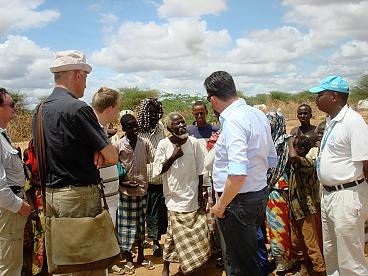It’s not international solidarity that should be consigned to the scrapheap, but the European Commission
It’s not international solidarity that should be consigned to the scrapheap, but the European Commission
This week the European Commission presented its proposals for a migration compact with a number of developing countries, most of them in Africa. They further presented a proposal which would make it easier for well-educated people to enter the EU to work. Both measures demonstrate that the Commission continues to think only of the interests of major corporations, while ignoring the interests of ordinary people.

SP leader Emile Roemer and Member of Parliament Eric Smaling visited Kenya in 2011
The Commission is hoping to halt the stream of migrants into the EU by means of deals with third countries. These include states well-known for their serious abuses of human rights, such as Sudan and Eritrea. Human rights experts at the Commission complain, quite correctly, that human rights policy no longer plays any role in this: anything and everything is acceptable, as long as it means fewer people come to Europe.
Corporate business will play a major role in these plans: via the EU funds and the member states, investors are attracted who then make sure that even more money is made available. Great for the multinationals, but they don’t of course do business if there aren’t profits to be had. Moreover, it is these same multinationals which ensure that all of their earnings in developing countries are immediately ferried to tax havens and that, most importantly, they don’t pay any taxes in the developing countries themselves.
If developing countries fail to curb the flow of migrants, sanctions will be imposed on them, in relation to both trade, and development moneys. If I might always have thought that the sole aim of development cooperation was to combat poverty, it’s now clear that a second goal has been added, that of preventing people from coming to the EU. A small side-note: according to the Universal Declaration of Human Rights, everyone has the right to leave his or her country. But as we’ve seen, human rights no longer play any role in this.
To make matters even worse, the Commission has at the same time introduced a proposal with precisely the intention of giving well-educated people the chance to enter Europe to work. That’s good for our businesses, the Commission says, allowing us to see straight away how close the relationship is between Brussels and the multinationals. You might expect that given the unemployment crisis that prevails in the EU, the Commission would give priority to member state programmes designed to offer some prospects to unemployed people through training. Evidently, however, big corporations prefer to move quickly to attract labour – cheaper labour – from Africa, than contribute to training for people from the EU itself. And in this the Commission slavishly follows the commands of its masters.
This proposal simply creates more confusion. What should you do as an African man or woman, when you see that the frontiers of Europe are opening wider to the well-educated, but you don’t fit the criteria? Simply go to Europe yourself. So on the one hand the European Commission is telling developing countries to halt the migration flow, and on the other undermining this. Add to this the fact that it is well-educated people who are badly needed in developing countries in order to make a contribution to economic development, and you can clearly see that it’s absolutely not in the interests of those countries if a brain drain to the EU is set in motion.
If you really wanted to act in solidarity with developing countries then you’d do what SP Member of Parliament Eric Smaling has suggested: “We propose the establishment of vocational schools so that young people can be trained in technical skills and so support themselves and be able to make an important contribution to their countries. This would ensure work and income and in this way remove the impulse for migration, including in dangerous journeys through deserts and over seas.” His proposal to this effect won the support of the Dutch national Parliament. More ideas on development cooperation can be read in his official note to Parliament, which has been translated as ‘Trading in the Colours of the Heart’.
Only one conclusion remains possible: it’s not international solidarity that should be consigned to the scrapheap, but the European Commission.
- See also:
- Dennis de Jong
